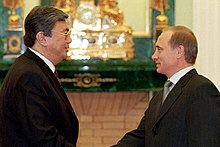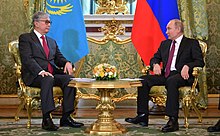Kassym-Jomart Tokayev
Additionally, Tokayev outlined several key areas of focus for the government, including the development of sports, the timely payment of pensions, and providing support for domestic producers—measures deemed essential for ensuring the long-term economic and social stability of Kazakhstan.
[15] However, in November 2001, during an interview with Khabar Agency, Tokayev threatened to resign unless Nazarbayev took action against certain government officials whom he accused of undermining the executive branch and obstructing necessary democratic reforms.
[34] From there, he guaranteed electoral transparency and insisted that Kazakhstan is a democratic state which Tokayev cited as reason for a president to be elected according to the "will of the people" as well as eliminate "political uncertainty".
[45] In the early years of his presidency, Tokayev governed under the significant influence of Nursultan Nazarbayev, who continued to hold key positions, including the chairmanship of the Security Council, the ruling Nur Otan party, and the Assembly of People of Kazakhstan (QHA).
[54] Tokayev outlined main directions for Kazakhstan which were increasing the incomes of population, eradication of corruption, judicial reforms, creating new jobs with decent wages, solving housing issues, fair social policies, regional developments, spiritualism, foreign national interests and youth opportunities.
[56] In June 2019, following a military ammo deposit blast in the town of Arys which resulted in evacuations of residents and hundreds of injuries, Tokayev launched a criminal case and ordered the Interior and Defence ministries to prevent possible more explosions, pledging that any perpetrators would be prosecuted.
From there, he spoke of optimizing Kazakhstan's social system, increasing productivity and a greener economy, leveling business conditions, investing more in education and overseeing the state's administration as it becomes more sensitive and accountable.
[75] Tokayev criticized the government and central bank for their inaction, calling for a reduction in inflation to 2–4% and attributing the rise in prices to an excess money supply generated by pandemic relief measures.
[96][97] In January 2021, Tokayev at the opening first session of the 7th Parliament proposed to reduce the electoral threshold from 7% to 5%, stating it would encourage more registered parties to participate in the future parliamentary elections as well as the vote option "Against all" to be re-included in the ballots once again.
[99] In autumn 2020, Tokayev announced date for 2021 legislative electionss, where he asserted that the electoral and political process had been liberalised to allow for greater involvement in civil society and that the newly incoming parliament convocation will focus on support for socio-economic reforms.
[101] In the aftermath of vote, the ruling Nur Otan despite losing dozen seats, topped the results in which the Organization for Security and Co-operation in Europe (OSCE) citied that the elections "lacked genuine competition".
[105] He appointed Erzhan Kazykhanov to the post, whom was instructed to deal with issues of expanding international cooperation in the humanitarian sphere, climate diplomacy, as well as promoting Kazakhstan's key foreign policy initiatives.
[109] On 18 August 2021, he instructed the Ministry of Foreign Affairs to attempt to provide a maximum assistance in returning ethnic Kazakhs residing in Afghanistan, while noting that the issue of accepting Afghan refugees would not be considered.
[114] In late 2020, Russian lawmakers Vyacheslav Nikonov and Yevgeny Fyodorov made remarks on how the entire Kazakhstani territory was a gift given by the Soviet Union and that was currently being leased by Russia.
[124] Following the breakout of the 2020 Nagorno-Karabakh war, Tokayev called on Armenia to withdraw from the disputed territory, citing the United Nations Security Council accordance to which he claimed that the Armenian government failed to fulfill for its past 30 years.
On 2 February 2020, he met with U.S. Secretary of State Mike Pompeo during his visit to Astana where both sides expressed the importance of deepening bilateral ties across the entire spectrum of cooperation, including trade, investment, IT technologies, promoting democratic values and combating international terrorism.
Pompeo wished for Tokayev in his success in implementing political reforms with an open skies agreement being signed which created a legal basis for launching direct regular flights between Kazakhstan and U.S.[128] According to some analysists, Pompeo's visit to Kazakhstan was seen as an attempt to counter China's influence within the country as he had met with ethnic Kazakh families of whom were victims of the Xinjiang internment camps and urged for Tokayev to pressure China over its persecution of ethnic Uyghur and Kazakhs.
In response to the sharp rise, Tokayev introduced price controls on LPG, diesel, gasoline, and essential goods in an effort to stabilize the situation and address public concerns.
[132][133][134] However, the protests quickly escalated into large-scale nationwide civil unrest, driven by grievances over economic inequality, corruption, and political stagnation under Tokayev's administration and the long rule of former president Nursultan Nazarbayev.
[161] He highlights reducing inequality, promoting political accountability, fair wealth distribution, and creating job opportunities for youth, alongside reforms in education and technological innovation with an aim to foster a more inclusive society, national unity, and social stability.
[171][172][173][174] In September 2023, Tokayev emphasized the need for a new global movement for peace, highlighting Kazakhstan’s role in the Astana Process for Syria and the Congress of Leaders of World and Traditional Religions as key platforms for fostering inter-civilizational dialogue.
[189] During his September 2022 visit to New York City, Tokayev emphasized Kazakhstan's desire to deepen economic and business ties with the US, highlighting opportunities in energy, agriculture, and IT, and reaffirming the country's commitment to fostering long-term strategic partnerships.
[192] In August 2023, Tokayev met with US Senator Gary Peters in Akorda, reaffirming the US as Kazakhstan's strategic partner in strengthening global security, nuclear non-proliferation, and promoting diplomatic values.
[193] On 19 September 2023, during the first-ever US presidential hosted C5+1 diplomatic summit, Tokayev met with President Joe Biden where he emphasized the importance of the United States confirming its security guarantees for Central Asia, particularly in supporting the region's nuclear-free status.
[197] Because of that, Tokayev has been described as "Nazarbayev's political birthchild",[198] while his opponents and critics referred him as "furniture" (Russian: мебель, mebel), a ridicule term first coined by exiled Kazakh businessman Mukhtar Ablyazov in 2019.
He said that Kazakhstan is "highly vulnerable to climate change as a landlocked and developing state" with a heavy reliance on fossil fuels and proposed for the planting for two billion trees within the country in order increase carbon absorption and curb looming desertification problems.
[202] Tokayev described his vision regarding corruption, calling it a "direct damage to national security" and advocated for the need of accountability for implementation of state programs and the use of budget funds by äkıms.
[203] On 28 November 2019, he signed the "On Amendments and Additions to Certain Legislative Acts of the Republic of Kazakhstan on Civil Service and Anti-Corruption Issues" law into place, which obliged government ministers and äkıms to resign if the top officials within institutions are found guilty of corruption.
Tokayev also rejected the proposed construction of the Trans-Caspian Gas Pipeline to Azerbaijan, in which the EU officials desired due to the likelihood of opposition from other nations bordering the Caspian Sea.
[212] During the 2021 State of the Nation Address, Tokayev noted that Russian is an official language within Kazakhstan, adding that its use can't be hindered in accordance to the law and from there, he obliged to punish to any person taking part in discriminating on the basis of "linguistic and national grounds", a move that was viewed to have occurred in result of a backlash by Russian officials after a viral incident on YouTube showing Kostanay native Quat Ahmetov visiting places and forcing employees to speak Kazakh which led to a series of criminal cases by security agencies and Ahmetov fleeing the country.



















